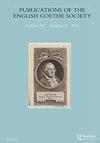Egmont and Memory
IF 0.1
3区 文学
0 LITERATURE, GERMAN, DUTCH, SCANDINAVIAN
引用次数: 0
Abstract
Abstract This essay uses memory to cut through conventional, binary distinctions that seem to offer analytical approaches to Egmont, but ultimately disappoint. It contrasts memory and history as markers of different attitudes to the past, and ways of knowing, among the drama’s characters. After showing that Egmont’s appeal is based on the affective immediacy that distinguishes memory from history, the essay argues that he is as much a ‘new politician’ as Alba and Oranien, well aware of the political power of the imagination, fully conscious of what the Spanish occupation means in Brussels, and as capable as his antagonists of a calculated response. This approach also allows a reading of the fifth act, and of Egmont’s final vision, that is consistent with the rest of the play.埃格蒙特与记忆
本文使用记忆来突破传统的二元区分,这些区分似乎为埃格蒙特提供了分析方法,但最终令人失望。它对比了记忆和历史,作为戏剧人物对过去的不同态度和认识方式的标志。在展示了埃格蒙特的吸引力是基于将记忆与历史区分开来的情感直接性之后,这篇文章认为他和阿尔巴和奥拉宁一样是一位“新政治家”,他很清楚想象力的政治力量,充分意识到西班牙占领在布鲁塞尔意味着什么,并且和他的对手一样有能力做出深思熟虑的回应。这种方法也允许对第五幕的解读,以及埃格蒙特的最终愿景,这与戏剧的其余部分是一致的。
本文章由计算机程序翻译,如有差异,请以英文原文为准。
求助全文
约1分钟内获得全文
求助全文
来源期刊

Publications of the English Goethe Society
LITERATURE, GERMAN, DUTCH, SCANDINAVIAN-
CiteScore
0.10
自引率
0.00%
发文量
15
 求助内容:
求助内容: 应助结果提醒方式:
应助结果提醒方式:


